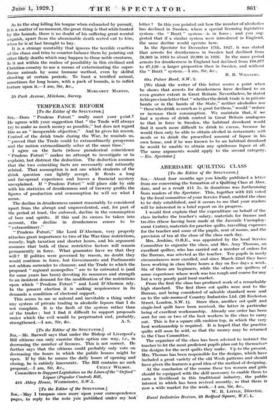TEMPERANCE REFORM [To the Editor of the SPECTATOR.] Sut,—Does "
Prudens Futuri " really meet your point ? He agrees with your suggestion that "the Trade will always try to make as much money as possible," but does not regard this as an "insuperable objection." And he gives his reason. Control of the drink trade during the War, he reminds us, "proved that the Trade could be extraordinarily prosperous and the nation extraordinarily, sober at the same time."
I agree on the facts (whose paradoxical coincidence " Prudens Futuri " makes no attempt to investigate or to explain), but distrust the deduction. The deduction assumes that the two coinciding facts are necessarily and rationally related. That assumption is not one which students of the drink question can lightly accept. It flouts a long and far-spread experience and leaves a financial mystery unexplained. If " Prudens Futuri " will place side by side with his statistics of drunkenness and of brewery profits the figures of production and consumption he will see what I mean.
The decline in drunkenness cannot reasonably be considered apart from the abrupt and unprecedented, and, for part of the period at least, the enforced, decline in the consumption of beer and spirits. If this and its causes be taken into account, the decline in drunkenness ceases to be "extraordinary."
" Prudens Futuri," like Lord D'Abernon, very properly attaches great importance to two of the War-time restrictions, namely, high taxation and shorter hours, and his argument assumes that both of, these restrictive factors will remain permanently in force. What guarantee have we that they will ? If politics were governed by reason, no doubt they would continue in force, but Governments and Parliaments not seldom surrender to clamour, and the Trade to which the proposed "regional monopolies" are to be entrusted is (and for some years has been) devoting its resources and strength to an insistent -demand for the modification of the restrictions upon which " Prudens Futuri " and Lord D'Abernon rely. In the present election it is making acquiescence in its demands a condition of electoral support.
This seems to me so natural and inevitable a thing under any system of private trading in alcoholic liquors that I do not complain. It is the fault of . the system rather than of the trader ; but I find it difficult to support proposals under which the evil would be perpetuated and, probably,










































 Previous page
Previous page